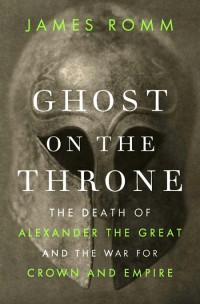Ghost On The Throne: The Death of Alexander the Great and the War for Crown and Empire
By James Romm
Published by Alfred A. Knopf, Borzoi Books, New York, 2011 Buy this Book!
James Romm is the pen name of James H. Ottaway, Jr., a Professor of Classics at Bard College, New York. “The story of Alexander’s conquests is known to many readers,” writes the author in the Preface, “but the dramatic and consequential sequel to that story is much less well-known. It is a tale of loss that begins with the greatest loss of all, the death of the king who gave the empire its center … The era that followed came to be defined by the absence of one towering individual, just as the previous era had been defined by his presence. It was as though the sun had disappeared from the solar system… The brightest celestial bodies in this new, sunless cosmos were Alexander’s top military officers, who were also in some cases his closest friends. Modern historians often refer to them as ‘the Successors’ (or ‘Diadochs,’ a Greek word meaning virtually the same thing). But that term is anachronistic for the first seven years after Alexander’s death, when none of these men tried to succeed the king; they vied for his power but not his throne.” Members of the Macedonian royal family, the Argeads, could only have assumed the throne, although by 308 B.C. the era of the Argead dynasty was well and truly over.
Ghost on the Throne is a clear and accurate historical account that chronologically details the deadly conflicts among both the military generals who had been appointed by Alexander as satraps of huge regional areas (as well as Perdiccas, in charge in Babylon), and the members of the Macedonian royal family, which included Olympias, Alexander’s mother, and Rhoxane and her son, Alexander IV. Rhoxane and her son died around 313 B.C., probably from poisoning. On page 205 of the book the author summarizes the extent of the tragic account: “The pattern of mitosis that had beset the empire since Alexander’s death seemed to be recurring without end. First the royal family had split into two factions and designated two kings to take Alexander’s place; then the designs of Perdiccas had brought a split between two wives; finally all of Asia had been split by the falling-out of Perdiccas and Antipater, and by the war those two had handed down to their surrogates, Eumenes and Antigonus…”
For this history of the wars for Alexander’s crown and empire, author James Romm lists his most important sources in the Preface, beginning with the 2002 publication by Brian Bosworth, a “masterly study,” The Legacy of Alexander: Politics, Warfare, and Propoganda Under the Successors. The sources include the firsthand account of Hieronymous of Cardia (a Greek soldier of fortune) that was lost but “mined for information” by Arrian of Nicomedia in the second century A.D.; the first century B.C. account of Diodorus Siculus; the account of Pompeius Trogus, a Roman writer; the Lives of Plutarch from the late first and early second century A.D.; and the Notes of Photius, the ninth century A.D. patriarch of Constantinople. There is an extensive Bibliography, maps, illustrations, and 31 pages of Notes that will leave the reader confident in the accuracy of the outer or objective history. The author also writes that he has examined more unconventional or subjective accounts, such as those by “Athenaeus, collector of gossip and anecdotes, and the anonymous author of The Lives of the Ten Orators.” The Introduction that follows the Preface describes the great archaeological discovery by Manolis Andronikos in Vergina (Northern Greece) in 1977-79, a discovery that has been confirmed to be a Great Tumulus contemporary with Alexander, containing the remains of his relatives and close companions and possibly artifacts that belonged to Alexander himself. More »
